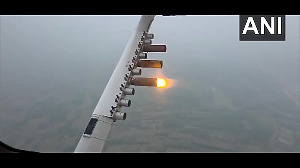Read Part I of the Interview: 'Let the nuclear deal go through'
In the second part of the interview he discusses India's relations with the US, China, Pakistan, Afghanistan and Iran.
He feels recent developments in Pakistan are welcome and insists that the peace process with that country cannot be reversed.
If and when the nuclear deal is operationalised, don't you think some credit should go to the NDA government that began the dialogue with the US under the umbrella of the NSSP (Next Steps in the Strategic Alliance)? Under the NSSP you were also talking about nuclear issues.
The NDA should not get credit at all. Let me explain. When we were talking to the Bush administration it was not in regard to 'full civilian nuclear cooperation' between India and the US. It was with regard to sanctions being lifted on dual-use items for high-technology. The NSSP was a long drawn out programme with various stages. The nuclear deal of July 2005 was a big jump for both countries.
My view is that because it was a quantum jump it attracted so many critics where as when we were doing it nobody was bothered because we were proceeding step by step.
Do you think if the nuclear deal goes through it will help soften the US stand on India's claim for permanent membership of the United Nations Security Council? Will the US help India and Pakistan cut a deal on Kashmir?
I don't think that is going to happen. On the issue of the UN Security Council I will be very frank in saying that no permanent member wants the Council to expand. They may say we support India, we support Japan, we support Germany but they are quite happy if the expansion is not done. They have a certain status. I am certain that they will not be overjoyed if an expansion takes place. It is not something that is going to come soon.
On Kashmir, what has been done in the last 4, 5 years has laid the ground for peace between India and Pakistan. Regardless of what the Europeans or Americans think or do, the dynamics have changed. It is the people of the two countries who are pushing for peace.
Once this nuclear deal goes through, will it impact India's relations with Russia and China?
Not at all. So far as Russia is concerned in the foreseeable future, defence ties will continue to be strong. There are other programmes. The nuclear deal with the US cannot go through without the Chinese nod. China is a member of the Nuclear Suppliers Group that works with consensus. If they don't like it they can stop it.
What is the biggest focus for the US behind the nuclear deal?
America is looking at this deal as an important element to improve relations with India.
Is China in the background?
I have no idea. Look, there is little doubt that the Americans would like China to be a mainstream player. America wants China to be a part of the multilateral framework. If China operates with the US, India and others it is good for them.
What is the biggest advantage for India?
The nuclear deal is good for us as well as the US. Our relations will improve with so many other countries. But if the deal does not go through, it will not be a disaster.
So you are fully satisfied that this deal will not affect India's strategic programme?
Yes. This is what I am told by the government.
Let us switch to Pakistan. How do you see the situation today? Do you find Pakistan moving towards stability?
This election has been very important for Pakistan. It has brought moderate democratic forces to the front. It has helped the Pakistan Peoples Party, the Pakistan Muslim League-Nawaz, the Awami National Party and the Muttahida Quami Movement also.
Second, it has been proven once again that in a democratic set up, the voice of the fundamentalists and extremists remains at a very low decibel level. In previous elections also, the fundamentalist forces could not make a dent.
Three, the elections have shown that Pakistanis want democracy and stability. They want economic growth and they don't want religious extremism and terrorism. The election results show that a large section of Pakistani society is taking on the extremists and defeating them.
I firmly believe that only democratic forces can take on extremism. But democratic forces also need the support of the armed forces here (in Pakistan). Neither of them can do it on their own. They have to come together.
What is important for Pakistan and also for India today is to see that in the coming few days a democratic government is in power which should be supported by the armed forces and they fight the extremists together. Obviously, there are differences between the PPP and the PML-N. I hope they can solve it without breaking up (the alliance). If they do (break up) then Pakistani society will call it a betrayal.
How do you envisage the role of President Pervez Musharraf?
The democratic forces certainly need the support of the armed forces. Is Musharraf an instrument in getting that support? If he is an obstacle, then there is a problem. If he can get the support of the armed forces to democratic forces, that's what matters.
What will be the implications for India?
The peace process will continue. There will be more openness with regard to commercial and economic matters, in which Musharraf was a bit hesitant. One hopes that SAFTA (the South Asian Free Trade Agreement) will become an instrument to move further. It will be good for not just two countries but the entire region.
What about America's strategic goals in Pakistan?
America is equally interested in the stability of Pakistan but their problem is that they have chosen one person (Musharraf). It is never a good policy. You cannot succeed specially in a country like Pakistan with such a policy. They have committed mistakes. I hope they will correct it. To continue their campaign in Afghanistan they need Pakistan's support.
If the US thinks that only one person can do it then they are antagonising others. If the electorate has rejected that person then how do you manage that situation? The US's concern should encompass the entire political structure of Pakistan.
A couple of days ago an Indian columnist wrote about the possibility of a more active role for India in Afghanistan and even in Iraq.
This is just not going to happen. In Afghanistan, any Indian hyper involvement will be objected to by Pakistan. The Musharraf regime didn't even permit India a transit facility. Afghanistan is a different territorial scene. It is in our interest to see that fundamental and extreme forces do not come to power there. Therefore, India should do whatever is possible to help the Hamid Karzai regime to foster peace.
India is spending about $800 million (about Rs 3,200 crore) on the construction of roads and hospitals. In our own way we have supported the efforts for the peaceful development of Afghanistan. The military task has been taken over by the Americans, NATO and others. There are some problems and we should be concerned that they are not being successful so far.
Diplomatically, economically, in non-military ways, we should help the international community in Afghanistan because it is in our interest to not allow extremists to take control.
The Americans have spoken explicitly against the Iran-Pakistan-India gas pipeline. What is your stand?
If it makes commercial sense to have the pipeline we should go ahead regardless of what the Americans say. We cannot accept the American perception of Iran. We have our perception. Of course, we don't want Iran to acquire nuclear weapons. But we have a different view from America on how to stop that happening. We cannot accept a boycott of Iran.
You are helping in building a road from Iran to Afghanistan. You are helping in the development of Charbag in Uzbekistan. India wants Iranian cooperation in railway transit to Central Asia. You have oil and gas coming from Iran.
Iran is a big factor in the Gulf region. You have over four million expatriates living in the Gulf sending millions of dollars in foreign exchange every year which helps sustain the economies of Kerala, Andhra and Karnataka. So how can you agree with the Americans?
Are we any closer to a solution to the Kashmir issue?
I don't think we are close to a solution, but now there is an agreement between the two countries that terrorism and military means cannot solve the problem. This understanding is not only between government to government but even between people to people. So the direction in which the NDA had started has proven a good idea. Bus services and more contacts across the border help. It minimises the chances of armed conflict.
There is an understanding between the people of two countries that violence is not going to solve the Kashmir issue. A final understanding will take time. I am not bothered about what and how Kosovo gets independence or Northern Ireland moves on. This is not going to affect Kashmir. If the All-Parties Hurriyat Conference comes into electoral politics then it is a very good sign.
How do you see the axis of democracy of the US, Australia, Japan and India, which held joint naval exercises recently? China has protested against it.
I have said it is not a good thing for India. Look, we are trying to negotiate the border issue with China and normalise relations. India was pressured by Japan's leaders. Now, Australia has turned around and said we don't want to take part in it. Where have we been left? There was no need for a quadrilateral exercise, you can have bilateral exercises.
Since the 1990s you have been having bilateral exercises with the US. But, suddenly you make this an anti-Chinese affair, naturally China will react.
What are the biggest threats to India's security?
The biggest threat is extremist forces in Pakistan and Afghanistan. This is a new era. We are no longer in the Cold War. There is no possibility of any one country invading India. Nobody can say to you that you should not get close to so and so. China is close to the US. Today, US Secretary of State Condoleezza Rice is in China discussing North Korea's nuclear programme. Aren't they cooperating? Today, the countries are not saying 'either you are with us or against us.'
Countries are cooperating with rivals. You are cooperating with the US. The US is cooperating with Pakistan even though to a certain extent it is going against us. This is a different ball game altogether.
Why does a majority of India's strategic community consider China a threat?
I think they are overtly concerned with China. What I want to say is that you look at the new picture. Forget the old Cold War mentality. Unless you look at it from a new angle you will be mistaken.
Is there a change in China's stance about the border issue? Previously, both India and China had agreed that there would not be any transfer of populated areas. Now, they are talking about Tawang which is a populated area.
They haven't said that. There are some ten points in the guidelines, they are asking why are you talking about only one guideline? After the statement of India's Army Chief General Deepak Kapoor on China it is quite clear that things are quite different than what the media is talking about. I want the border issue to be settled as quickly as possible.
During the NDA government, we set up the mechanism to talk about the borders. We initiated the process of having guidelines which were finalised after we left. We have to settle the border issue. The issue can only be settled by compromise.
Like?
I am not going to sit down and say this is it. When you talk about the negotiations, you are talking about compromise. Otherwise, it is not negotiation. Otherwise, India can say you get out from here. And you don't have the means to enforce that. So that is not possible. So what kind of compromise is possible can only be decided at the negotiators's table.
Some believe that both sides are not ready for compromise.
I don't agree with that view.
Will the people of India accept if some land is given to China as a part of compromise?
Of course, Arunachal Pradesh is not going to China. People will never accept that. But compromises at a local level, I think, are always possible. We cannot say that not an inch of our territory will go. Then there are no negotiations.
Those who talk that language say first China claims your territory and then asks for it.
But China is saying you have occupied their land. They don't regard the McMahon Line as legal. They are saying this since the days of Zhou En Lai.





